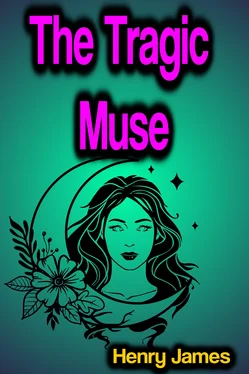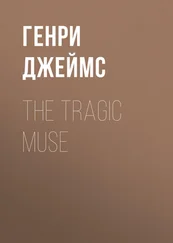Henry James - The Tragic Muse
Здесь есть возможность читать онлайн «Henry James - The Tragic Muse» — ознакомительный отрывок электронной книги совершенно бесплатно, а после прочтения отрывка купить полную версию. В некоторых случаях можно слушать аудио, скачать через торрент в формате fb2 и присутствует краткое содержание. Жанр: unrecognised, на английском языке. Описание произведения, (предисловие) а так же отзывы посетителей доступны на портале библиотеки ЛибКат.
- Название:The Tragic Muse
- Автор:
- Жанр:
- Год:неизвестен
- ISBN:нет данных
- Рейтинг книги:5 / 5. Голосов: 1
-
Избранное:Добавить в избранное
- Отзывы:
-
Ваша оценка:
- 100
- 1
- 2
- 3
- 4
- 5
The Tragic Muse: краткое содержание, описание и аннотация
Предлагаем к чтению аннотацию, описание, краткое содержание или предисловие (зависит от того, что написал сам автор книги «The Tragic Muse»). Если вы не нашли необходимую информацию о книге — напишите в комментариях, мы постараемся отыскать её.
The Tragic Muse — читать онлайн ознакомительный отрывок
Ниже представлен текст книги, разбитый по страницам. Система сохранения места последней прочитанной страницы, позволяет с удобством читать онлайн бесплатно книгу «The Tragic Muse», без необходимости каждый раз заново искать на чём Вы остановились. Поставьте закладку, и сможете в любой момент перейти на страницу, на которой закончили чтение.
Интервал:
Закладка:
"There are many, no doubt, which she would do well to leave alone!" laughed the Frenchwoman.
"I shouldn't like to see her represent a very bad woman—a really bad one," Mrs. Rooth serenely pursued.
"Ah in England then, and in your theatre, every one's immaculately good? Your plays must be even more ingenious than I supposed!"
"We haven't any plays," said Gabriel Nash.
"People will write them for Miss Rooth—it will be a new era," Sherringham threw in with wanton, or at least with combative, optimism.
"Will you, sir—will you do something? A sketch of one of our grand English ideals?" the old lady asked engagingly.
"Oh I know what you do with our pieces—to show your superior virtue!" Madame Carré cried before he had time to reply that he wrote nothing but diplomatic memoranda. "Bad women? Je n'ai joué que ça, madame. 'Really' bad? I tried to make them real!"
"I can say 'L'Aventurière,'" Miriam interrupted in a cold voice which seemed to hint at a want of participation in the maternal solicitudes.
"Allow us the pleasure of hearing you then. Madame Carré will give you the réplique," said Peter Sherringham.
"Certainly, my child; I can say it without the book," Madame Carré responded. "Put yourself there—move that chair a little away." She patted her young visitor, encouraging her to rise, settling with her the scene they should take, while the three men sprang up to arrange a place for the performance. Miriam left her seat and looked vaguely about her; then having taken off her hat and given it to her mother she stood on the designated spot with her eyes to the ground. Abruptly, however, instead of beginning the scene, Madame Carré turned to the elder lady with an air which showed that a rejoinder to this visitor's remarks of a moment before had been gathering force in her breast.
"You mix things up, chère madame, and I have it on my heart to tell you so. I believe it's rather the case with you other English, and I've never been able to learn that either your morality or your talent is the gainer by it. To be too respectable to go where things are done best is in my opinion to be very vicious indeed; and to do them badly in order to preserve your virtue is to fall into a grossness more shocking than any other. To do them well is virtue enough, and not to make a mess of it the only respectability. That's hard enough to merit Paradise. Everything else is base humbug! Voilà, chère madame, the answer I have for your scruples!"
"It's admirable—admirable; and I am glad my friend Dormer here has had the great advantage of hearing you utter it!" Nash exclaimed with a free designation of Nick.
That young man thought it in effect a speech denoting an intelligence of the question, yet he rather resented the idea that Gabriel should assume it would strike him as a revelation; and to show his familiarity with the line of thought it indicated, as well as to play his part appreciatively in the little circle, he observed to Mrs. Rooth, as if they might take many things for granted: "In other words, your daughter must find her safeguard in the artistic conscience." But he had no sooner spoken than he was struck with the oddity of their discussing so publicly, and under the poor girl's handsome nose, the conditions which Miss Rooth might find the best for the preservation of her personal integrity. However, the anomaly was light and unoppressive—the echoes of a public discussion of delicate questions seemed to linger so familiarly in the egotistical little room. Moreover, the heroine of the occasion evidently was losing her embarrassment; she was the priestess on the tripod, awaiting the afflatus and thinking only of that. Her bared head, of which she had changed the position, holding it erect, while her arms hung at her sides, was admirable; her eyes gazed straight out of the window and at the houses on the opposite side of the Rue de Constantinople.
Mrs. Rooth had listened to Madame Carré with startled, respectful attention, but Nick, considering her, was very sure she hadn't at all taken in the great artist's little lesson. Yet this didn't prevent her from exclaiming in answer to himself: "Oh a fine artistic life—what indeed is more beautiful?"
Peter Sherringham had said nothing; he was watching Miriam and her attitude. She wore a black dress which fell in straight folds; her face, under her level brows, was pale and regular—it had a strange, strong, tragic beauty. "I don't know what's in her," he said to himself; "nothing, it would seem, from her persistent vacancy. But such a face as that, such a head, is a fortune!" Madame Carré brought her to book, giving her the first line of the speech of Clorinde: "Vous ne me fuyez pas, mon enfant, aujourd'hui." But still the girl hesitated, and for an instant appeared to make a vain, convulsive effort. In this convulsion she frowned portentously; her low forehead overhung her eyes; the eyes themselves, in shadow, stared, splendid and cold, and her hands clinched themselves at her sides. She looked austere and terrible and was during this moment an incarnation the vividness of which drew from Sherringham a stifled cry. "Elle est bien belle—ah ça," murmured the old actress; and in the pause which still preceded the issue of sound from the girl's lips Peter turned to his kinsman and said in a low tone: "You must paint her just like that."
"Like that?"
"As the Tragic Muse."
She began to speak; a long, strong, colourless voice quavered in her young throat. She delivered the lines of Clorinde in the admired interview with Célie, the gem of the third act, with a rude monotony, and then, gaining confidence, with an effort at modulation which was not altogether successful and which evidently she felt not to be so. Madame Carré sent back the ball without raising her hand, repeating the speeches of Célie, which her memory possessed from their having so often been addressed to her, and uttering the verses with soft, communicative art. So they went on through the scene, which, when it was over, had not precisely been a triumph for Miriam Rooth. Sherringham forbore to look at Gabriel Nash, and Madame Carré said: "I think you've a voice, ma fille, somewhere or other. We must try and put our hand on it." Then she asked her what instruction she had had, and the girl, lifting her eyebrows, looked at her mother while her mother prompted her.
"Mrs. Delamere in London; she was once an ornament of the English stage. She gives lessons just to a very few; it's a great favour. Such a very nice person! But above all, Signor Ruggieri—I think he taught us most." Mrs. Rooth explained that this gentleman was an Italian tragedian, in Rome, who instructed Miriam in the proper manner of pronouncing his language and also in the art of declaiming and gesticulating.
"Gesticulating I'll warrant!" declared their hostess. "They mimic as for the deaf, they emphasise as for the blind. Mrs. Delamere is doubtless an epitome of all the virtues, but I never heard of her. You travel too much," Madame Carré went on; "that's very amusing, but the way to study is to stay at home, to shut yourself up and hammer at your scales." Mrs. Rooth complained that they had no home to stay at; in reply to which the old actress exclaimed: "Oh you English, you're d'une légèreté à faire frémir. If you haven't a home you must make, or at least for decency pretend to, one. In our profession it's the first requisite."
"But where? That's what I ask!" said Mrs. Rooth.
"Why not here?" Sherringham threw out.
"Oh here!" And the good lady shook her head with a world of sad significance.
"Come and live in London and then I shall be able to paint your daughter," Nick Dormer interposed.
"Is that all it will take, my dear fellow?" asked Gabriel Nash.
"Ah, London's full of memories," Mrs. Rooth went on. "My father had a great house there—we always came up. But all that's over."
Читать дальшеИнтервал:
Закладка:
Похожие книги на «The Tragic Muse»
Представляем Вашему вниманию похожие книги на «The Tragic Muse» списком для выбора. Мы отобрали схожую по названию и смыслу литературу в надежде предоставить читателям больше вариантов отыскать новые, интересные, ещё непрочитанные произведения.
Обсуждение, отзывы о книге «The Tragic Muse» и просто собственные мнения читателей. Оставьте ваши комментарии, напишите, что Вы думаете о произведении, его смысле или главных героях. Укажите что конкретно понравилось, а что нет, и почему Вы так считаете.












